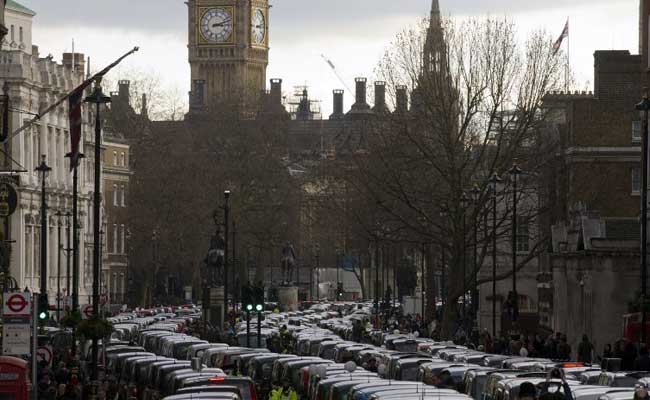
Taxi drivers block Whitehall as they demonstrate in central London. (AFP Photo)
LONDON:
Drivers of London's traditional black cabs blocked some of the city's busiest streets Wednesday in a protest at the lack of regulations imposed on Uber.
Thousands of drivers brought their vehicles to a standstill around Parliament Square and Whitehall, near the Houses of Parliament, tooting their horns at regular intervals to make their discontent clear.
The unions said drivers were protesting against the relaxation of rules put in place to restrict who could pick passengers up off the street, rules they said were designed to increase security for passengers.
They say the growth in private hire cars like those using Uber has also impacted congestion and air pollution.
"We feel that Uber exploits its drivers by using their self-employed status to extract maximum income from them which translates to those drivers working long hours," said Jim Kelly at the Unite union.
 "The reduction in safety for passengers because of the 'light touch' regime is to be deplored. It is a race-to-the bottom, when in 2016 we want the highest possible standards."
"The reduction in safety for passengers because of the 'light touch' regime is to be deplored. It is a race-to-the bottom, when in 2016 we want the highest possible standards."
London transport bosses decided in January not to impose a series of strict new rules on private hire cars, including those using apps like Uber.
Uber insists it does not want to put black cabs out of business.
"Common sense regulations combined with new technology can help ensure that black cabs and apps like Uber live side by side," it said in a statement.
"It's the best of both worlds. Londoners and tourists would be free to choose whether they want to hail a car on the street or push a button and get a ride for generations to come," said the statement.
Reportedly valued at over $60 billion (53 billion euros), Uber has expanded rapidly in cities around the world but has faced a string of regulatory challenges and opposition from longer-serving cab drivers.
Thousands of drivers brought their vehicles to a standstill around Parliament Square and Whitehall, near the Houses of Parliament, tooting their horns at regular intervals to make their discontent clear.
The unions said drivers were protesting against the relaxation of rules put in place to restrict who could pick passengers up off the street, rules they said were designed to increase security for passengers.
They say the growth in private hire cars like those using Uber has also impacted congestion and air pollution.
"We feel that Uber exploits its drivers by using their self-employed status to extract maximum income from them which translates to those drivers working long hours," said Jim Kelly at the Unite union.

Up to 5,000 taxi drivers protested in central London over threats to passenger safety and deregulation. (AFP Photo)
London transport bosses decided in January not to impose a series of strict new rules on private hire cars, including those using apps like Uber.
Uber insists it does not want to put black cabs out of business.
"Common sense regulations combined with new technology can help ensure that black cabs and apps like Uber live side by side," it said in a statement.
"It's the best of both worlds. Londoners and tourists would be free to choose whether they want to hail a car on the street or push a button and get a ride for generations to come," said the statement.
Reportedly valued at over $60 billion (53 billion euros), Uber has expanded rapidly in cities around the world but has faced a string of regulatory challenges and opposition from longer-serving cab drivers.
Track Latest News Live on NDTV.com and get news updates from India and around the world

